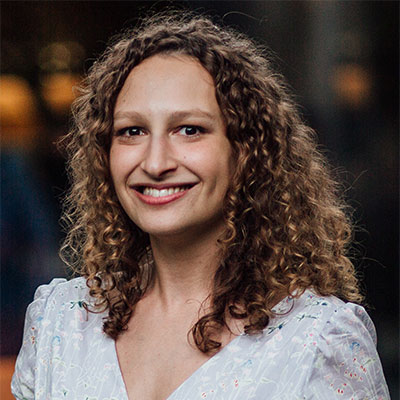Leonie, 44, knew where her depression came from – but that didn’t make it any easier to live with. Growing up in South Africa, where both her parents were violently attacked, left her with what she calls “a constant, low hum of insecurity and threat, almost like tinnitus.” Her father died when she was 17, and in her 20s, she became her mother’s carer. By the autumn of 2019 she had been on antidepressants for more than half her life, with barely a break.
The medication helped to stabilise Leonie during the most severe episodes that left her bed-bound, but in between she was advised to continue on a preventative dose. She experienced a relentless low-level depression: “It was almost more debilitating, because you’re functional but only half alive. You’re getting by and everything looks okay, but for me, that’s a life half-lived.”
She tried four different selective serotonin reuptake inhibitors – the most common class of antidepressants known as SSRIs – as well as two varieties of therapy. The problem was, she says, that in her experience antidepressants numb you. “It’s what makes you able to deal with the difficult feelings and carry on functioning. But if you’re numb to your own pain, it’s really hard to unpack it and explore it in therapy, make sense of it and file it in a different way. All you’re doing is keeping it there under a band-aid.”
By November 2019, she was desperate. “I thought, I’ve got to do something different, because what I’m doing is slowly killing me,” she says. She came across an innovative new trial on Google, and she felt hope.
Read more about psychedelics and mental health:
- Magic mushrooms and mental health: could psychedelic drugs treat depression?
- Psychedelic healing: could magic mushrooms help reboot the brain?
Psychedelics vs antidepressants: head to head
For the last decade, evidence has been building to support the theory that psilocybin – the key psychedelic ingredient in magic mushrooms and some other Class A illegal drugs – could be an effective tool to understand how mental illness manifests in the brain, as well as a potential treatment. Controlled studies found it had few side effects, and left most people with depression experiencing improved symptoms, and most people with terminal cancer less anxious about death.
“I wanted to know how good psilocybin really is,” says Dr Robin Carhart-Harris, head of the Centre for Psychedelic Research at Imperial College London. That meant comparing psilocybin with the standard treatment for depression on the NHS: antidepressants. (In the three months to September 2020, these were prescribed to more than six million people in England.) It meant conducting a double-blind, randomised control trial – the most rigorous scientific method of evaluating an intervention, the gold standard.
Every participant – including Leonie – was thoroughly screened by psychiatrists and other mental health professionals and weaned off antidepressants before taking part. They were randomly assigned to one of the two study arms – the psilocybin condition, or the antidepressant condition – but were not told which.
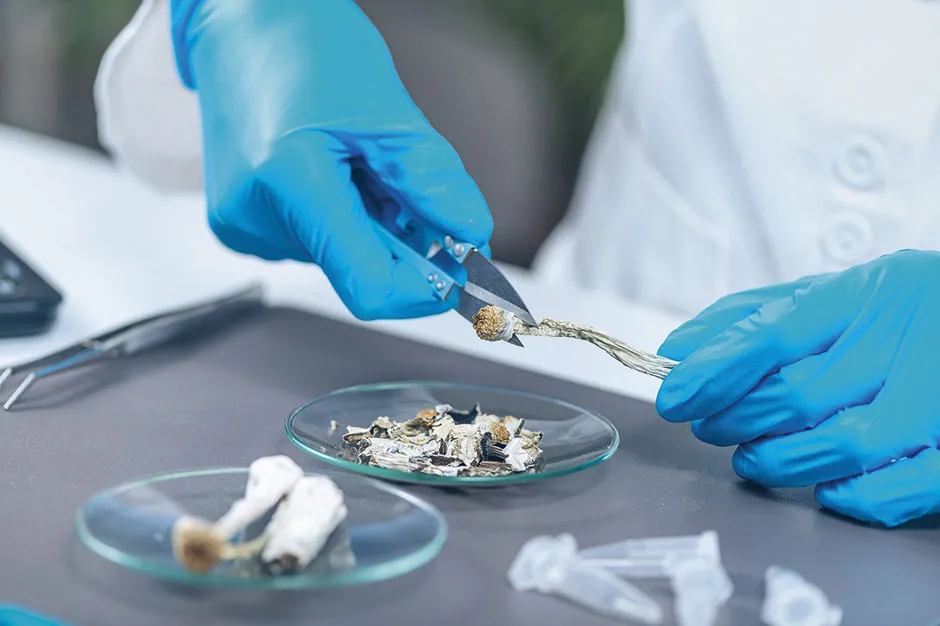
They knew they would receive two doses of psilocybin three weeks apart, but did not know if this would be a high or low dose. They also each had a pot of capsules to take at home, without knowing if this pot contained a placebo or escitalopram, a well-performing SSRI.
Participants in the psilocybin arm received 25mg of the drug. “That is a whopping dose, enough for a transformative experience. It could be profoundly blissful; it could be profoundly scary; whatever the flavour of it, it tends to be very, very intense,” Carhart-Harris says. Those in the escitalopram arm received just 1mg of psilocybin – considered a placebo dose – and all would receive psychological support before, during and after dosing.
And that, explains Prof David Nutt, director of the Neuropsychopharmacology Unit at Imperial College London, is what makes this trial a game-changer; “That’s the real innovation – people didn’t know what they got, so it was a much better controlled, much more scientific comparison.”
How psilocybin allows the mind to heal
On the first day of the study, Leonie met with the two therapists who would be her guides. In a hospital room decorated with Himalayan salt lamps, artificial candles and fake plants, her therapists talked her through a visualisation of a deep-sea dive, which she describes as her “handrail” for the trip.
“Your guides are your anchor, and you can always pull yourself up on them to get back to the surface. But the invitation is to dive deep, to go down to the spiky, dark, grimy, slimy bottom of the ocean to find the pearl,” Leonie explains. The pearl, for her, was to get to grips with her depression.
The next day, she watched as the psilocybin was brought into the room in a beautiful ceremonial bowl, and took her dose. As she lay on the bed wearing an eye mask and headphones and listening to music, she understood the trauma of her life with new meaning.
The music sounded discordant at first, and Leonie saw an image of her mother as “a limping duck, waddling along with a broken limb”. The image encapsulated, she says, “my mum’s process of dying, how broken she was, her limping through a very unfulfilled life, one I felt like I was repeating and not finding the point of it at all.”
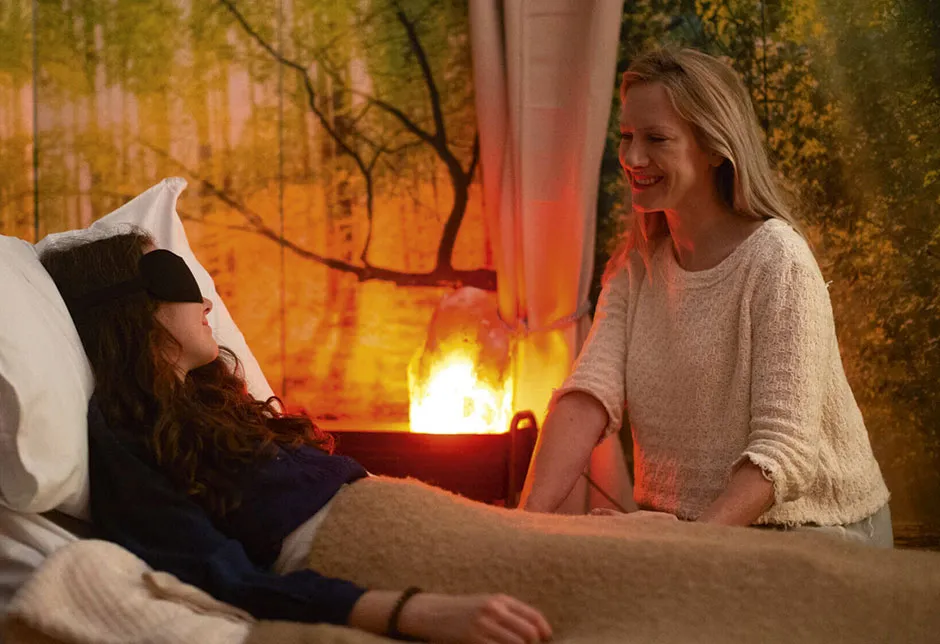
But as the music’s layers built up to a more expansive sound, “that broken discordant note that was my mother turned out to be a piece of the most exquisite, transformative masterpiece; all of a sudden, my mum’s broken notes made perfect sense in the symphony.”
Leonie finally felt able to see meaning in the loss, to reframe it, and separate herself and her life out from her mother’s. In what she calls “a real moment of ancestral healing”, she describes taking possession of her own life and mind: “I became this point in time; there was my mum, my mum’s mum, and my mum’s mum’s mum, and I felt pain radiating across the ages, and realised in that moment that that pain wasn’t mine.”
Recognising that pain brought a sense of freedom. “My depression became not me. I was liberated for the first time,” she says. She took off her eye mask, looked at her guide and said, “I’m surprisingly unbroken.”
This gave her a new sense of distance and separateness from the psychological distress that consumed her for decades: “A space was created between me and my depression; I no longer felt held prisoner,” she says. Instead of retreading the same ground over and over, it’s as if “there’s a fresh bed of snow, and you can start new paths, there are new options. In fact, that whole slope is an option now. Which way do you want to go next?”
This image of a fresh bed of snow reflects what Carhart-Harris and Nutt theorise is going on in the brain. In their earlier study of people with treatment-resistant depression, participants had brain scans before and after taking psilocybin, which showed the drug had a significant impact on particular networks, turning off the brain circuits of depression, Nutt says.
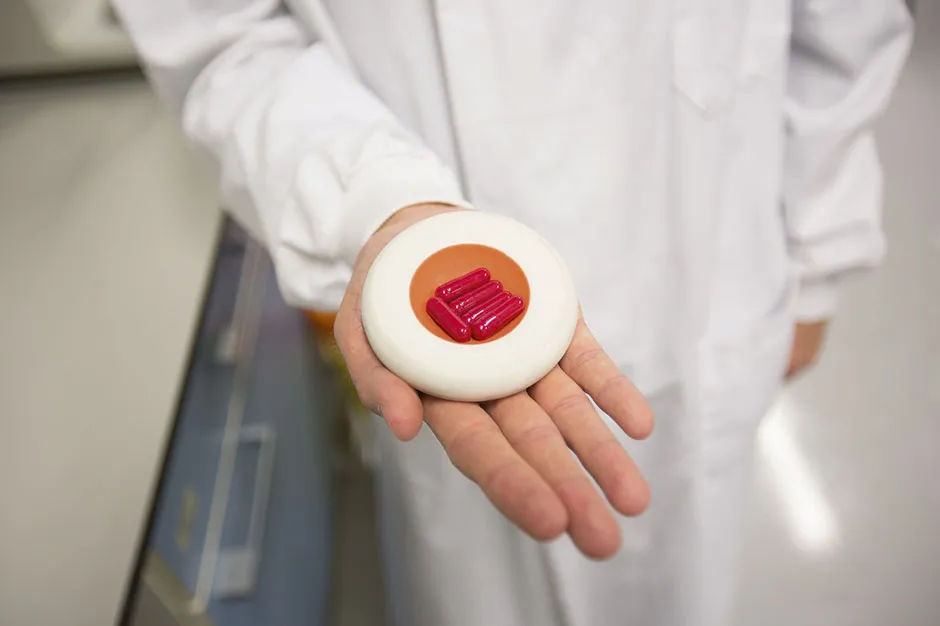
Carhart-Harris explains that when people develop depression, they build up protective defences to try and fight off the anxiety, fear and pain. “It’s a hibernation, a disconnection from the world, and that becomes self-reinforcing,” he says. It’s as if the person can only retread the same footsteps in the snow; they are stuck, ruminating and repeating the same behaviour that doesn’t help – in depression as in anorexia, alcoholism and OCD among other disorders.
Psilocybin, these scientists think, helps by stimulating the type of serotonin receptors in the brain called 5-HT2A – different from the type stimulated by SSRIs. These 5-HT2A receptors are found in the cortex. Carhart-Harris describes the cortex as “the aspect of the human brain that is uniquely expanded, relative to our closest evolutionary neighbours”.
The cortex is associated with species-specific functions like mind-wandering, imagination and abstract thinking. These receptors seem to be linked to plasticity – that is, to neurological change. “Psychedelics come in and free everything up, it’s a window of opportunity to think and behave in a different way, like a psychological rebirth afforded by this blast of plasticity,” says Carhart-Harris. It’s like a fresh layer of snow falling, so instead of retreading old footsteps, a person can ask, as Leonie did, “which way do I want to go next?”
MyDelica
Plasticity means change in the brain – which can be positive or negative – so the trial’s therapeutic aspect is crucial, says Carhart-Harris: “When you twin plasticity with care and compassion from your guide, promoting that in yourself, when you bring that to the experience and an intention to heal and open and let go – that’s the healing process.”
But not everyone taking psilocybin illegally will do it like this. That’s why Carhart-Harris and his team are launching a new app in April, called MyDelica. As evidence for psilocybin’s impact on mental health is building, more people are using it recreationally, even though it’s still illegal to be in possession of the drug.
While study participants are carefully screened and attended to by therapists in a safe environment, users in the wild are not. This concerns Carhart-Harris: “I know that will come with risks, because I know the potency of psychedelics,” he says.
MyDelica does not encourage or promote use of psychedelics but provides advice, such as having a sober guide with you, for those who are already taking them. “It’s an attempt to de-risk what’s happening now with the scaling-up of use – like a safety net,” he says.
But it is not just that: by asking MyDelica’s users questions about their psychological history and their trips, Carhart-Harris hopes to get rich, deep data on people taking psychedelics in all sorts of contexts. “It really enhances the science because we can get bigger data than we can in expensive controlled studies, and we can address different questions,” he says.
In controlled studies, people with a history of psychotic disorders are screened out; in the real world, they don’t screen themselves out. Carhart-Harris hopes this app will improve understanding of potential dangers. After all, an analysis of 346 self-reports by psilocybin users in February 2020 found that taking multiple doses of psilocybin in one session, or combining it with other substances, was linked with long-term negative outcomes, and in some cases the use of mushrooms in high doses was linked to medical emergencies.
Read more about psychedelics:
- Sleep, drugs and mental health: how altered states of consciousness could keep us happy
- Your brain on LSD: a guide through the most mind-blowing psychedelics research
- Small doses of psychedelics might help you solve problems
When will psilocybin treatment be available?
Carhart-Harris is hopeful that in 2021, psilocybin will be accepted as a mainstream mental health treatment. He cites influential figures in academic psychiatry, along with consultants and advisors for Big Pharma companies, who have begun working with psychedelic medicine start-ups.
These experts include Guy Goodwin, who is the former head of the European College of Neuropsychopharmacology and emeritus professor of psychiatry at the University of Oxford; and former head of the American Psychiatric Association Paul Summergrad, who is now the Dr Frances S Arkin Professor and chairman of psychiatry at Tufts University.
Carhart-Harris also mentions the Drug Policy Reform Group, a lobby group annexed to the Conservative Party, in which “there are quite active, vociferous people wanting to see change in drug policy”. But how long will it be before Big Pharma get involved?
“I’d be very surprised if they’re not taking this really quite seriously,” Carhart-Harris says. The mental healthcare company COMPASS produced the psilocybin used in his trial, and is also running a study for 216 patients with treatment-resistant depression, with results expected at the end of 2021.
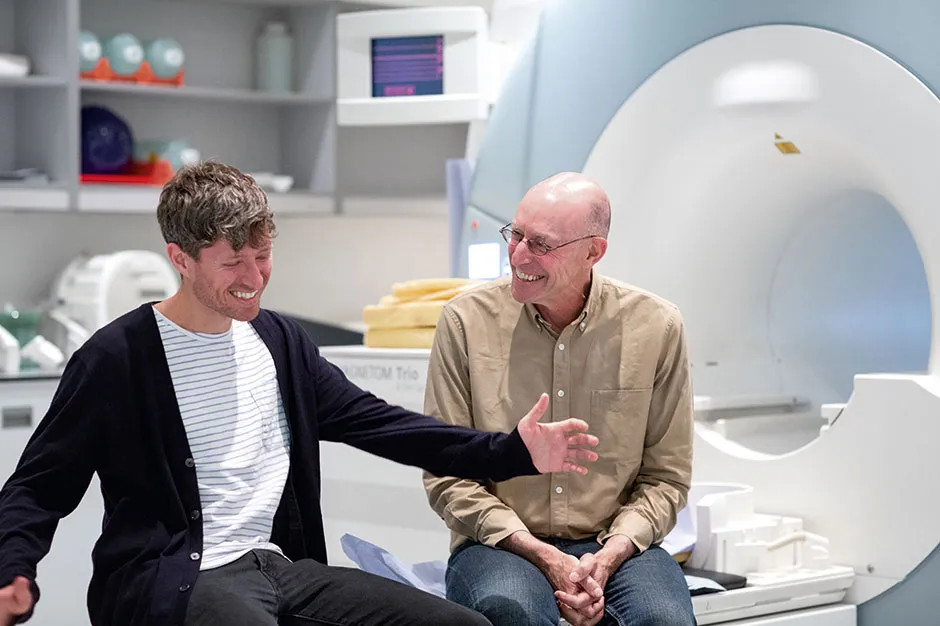
When I ask COMPASS co-founder Dr Ekaterina Malievskaia how long she thinks it will take for psilocybin to become a mainstream treatment, she says, “We’re just moving as fast as possible, but not faster.” She estimates three to five years from now.
Carhart-Harris is clear that psilocybin should not replace antidepressants, which do help some patients. “I don’t believe psychedelic therapy is the cure for everything; I just think it is a very powerful potential treatment option,” he says. “There is reason to be hopeful about treating your and your loved ones’ mental illnesses.”
There is a problem, however, and it’s quite a big one. Psilocybin is still classified as a Class A illegal substance. Nutt has been investigating the therapeutic potential of illegal drugs for 40 years, and he sounds optimistic that things are beginning to change.
“At least people like you are writing articles. Frankly, 10 years ago you probably wouldn’t have been allowed to; it would’ve been seen as too controversial and provocative. So I think the fact that we’re having an open discussion is truly, probably, the greatest thing we’ve achieved.”
Carhart-Harris and his team published the results of their gold-standard experiment in April 2021.
What’s next?
Leonie was convinced she had been in the escitalopram arm of the trial. Although the trip was powerful, she says, “I didn’t have the textbook experience. I did not turn into a panther in some Amazonian forest, lose all sense of self or not know where my arms were. I was able to get up halfway through to go to the bathroom.” But after the study was completed, she found out she’d had the high dose of psilocybin.
Then things went, in her words, spectacularly wrong. Stresses piled up: unemployment, financial insecurity, Brexit, a ruptured appendix. And then the country went into lockdown. Her depression returned and she went back on short-term antidepressants to stabilise her. “And then… I came off them. This is the longest I’ve been unmedicated since my early 20s,” she says. It is still a struggle, but she is “really feeling the feelings and getting through it, I have come out of this stronger and psychologically more resilient”.
It’s not that the psilocybin cured her, she says, but “I’m building on that idea that I’m not broken, that I can do this. It just takes practice, because being human is a bit messy. Every time I face the fear and come through – it really feels like that’s my healing.”
WARNING:Psilocybin is a Class A drug according to UK law. Anyone caught in possession of such substances will face up to seven years in prison, an unlimited fine, or both. More information and support for those affected by substance abuse problems can be found atbit.ly/drug_support.
- This article first appeared inissue 361ofBBC Science Focus Magazine–find out how to subscribe here
